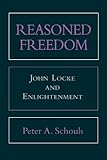Reasoned Freedom : John Locke and Enlightenment / Peter A. Schouls.
Material type: TextPublisher: Ithaca, NY : Cornell University Press, [2018]Copyright date: ©1992Description: 1 online resource (258 p.)Content type:
TextPublisher: Ithaca, NY : Cornell University Press, [2018]Copyright date: ©1992Description: 1 online resource (258 p.)Content type: - 9781501718342
- 192 20
- B1297
- online - DeGruyter
| Item type | Current library | Call number | URL | Status | Notes | Barcode | |
|---|---|---|---|---|---|---|---|
 eBook
eBook
|
Biblioteca "Angelicum" Pont. Univ. S.Tommaso d'Aquino Nuvola online | online - DeGruyter (Browse shelf(Opens below)) | Online access | Not for loan (Accesso limitato) | Accesso per gli utenti autorizzati / Access for authorized users | (dgr)9781501718342 |
Frontmatter -- Contents -- Preface -- 1. Locke, Descartes, and the Enlightenment -- A. Reason and the Nature of a Master -- 2. Human Nature and Reason -- 3. The Dogma ofl Infallible Reason -- 4. Infallible" Reason, Prejudice, and Passion -- B. Freedom and the Nature of a Master -- 5. Freedom and Unobstructed Action -- 6. Self-Determination -- C. The Education of a Potential Master -- 7. Human Nature and Education -- 8. Education, Reason, and Freedom -- Bibliography -- Index
restricted access online access with authorization star
http://purl.org/coar/access_right/c_16ec
Although John Locke has often been called the Enlightenment's great progenitor, his use of the concepts that characterize Enlightenment thought has rarely been examined. In this lucid and penetrating book, Peter A. Schouls considers Locke's major writings in terms of the closely related ideas of freedom, progress, mastery, reason, and education. The resulting intellectual portrait provides a historically nuanced interpretation of a thinker crucial to the development of Western political philosophy and philosophy of education. Schouls centers his analysis on Locke's Essay concerning Human Understanding, but he also reexamines the often-ignored texts on education. Stressing the originality of Locke's enterprise, Schouls first explores Locke's reliance on Descartes for a method for the pursuit of general knowledge. He then examines Locke's thinking on (self-)mastery and the importance of reason to its achievement. For Locke, a human being has a radically autonomous nature that enables him or her to attain mastery; nurture may help or hinder this achievement. Turning to the critical role of freedom in the struggle for self-liberation from passions and prejudices, Schouls concludes that, although wrong education explains widespread failure to achieve mastery, right education cannot guarantee its achievement. It is, rather, in the interplay of education, reason, and freedom that Schouls locates the revolutionary promise of Locke's account of human self-fulfillment.
Mode of access: Internet via World Wide Web.
In English.
Description based on online resource; title from PDF title page (publisher's Web site, viewed 26. Apr 2024)


